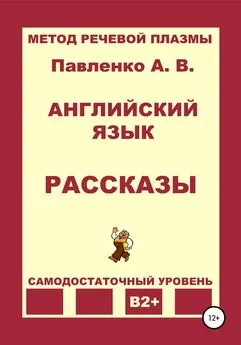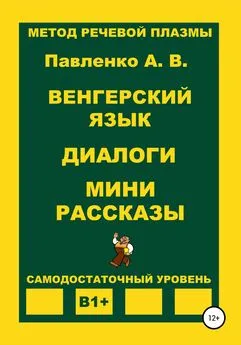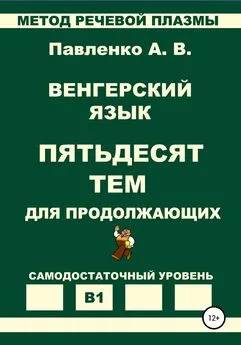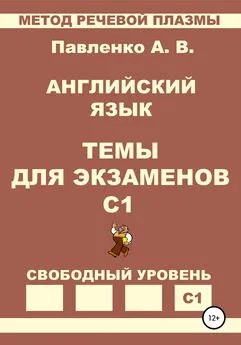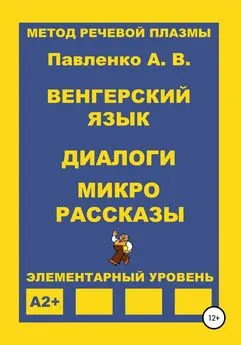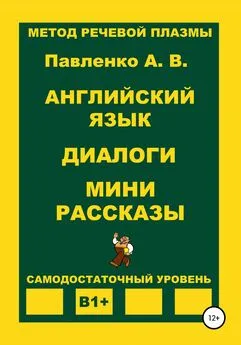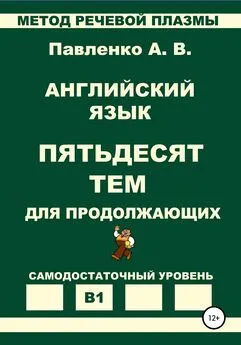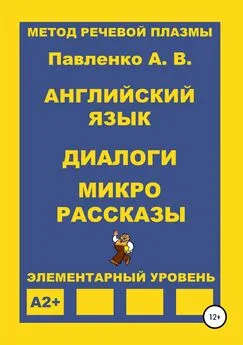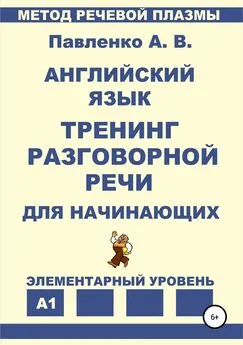Александр Павленко - Английский язык. Рассказы. Уровень В2+
- Название:Английский язык. Рассказы. Уровень В2+
- Автор:
- Жанр:
- Издательство:неизвестно
- Год:2022
- ISBN:нет данных
- Рейтинг:
- Избранное:Добавить в избранное
-
Отзывы:
-
Ваша оценка:
Александр Павленко - Английский язык. Рассказы. Уровень В2+ краткое содержание
Английский язык. Рассказы. Уровень В2+ - читать онлайн бесплатно ознакомительный отрывок
Интервал:
Закладка:
Pub Music in Edinburgh
Training 1
Greg first became involved in playing Irish music many years ago when he first visited Ireland. He was greatly inspired after attending some great folk festivals there. The first one he went to was in County Sligo. There were so many great groups playing there. There were thousands of tents and people everywhere, and there was a really great atmosphere.
Training 2
Greg took up the fiddle when he was a small child but dropped it when he came to the age of about thirteen. But after seeing those folk play in Ireland, Greg had to pick it up again. He brought some sheet music back from Ireland, and when he got back home, joined a local folk music club and tried a few tunes. First, they played the tunes very slowly. But gradually Greg learnt a few of them by heart.
Training 3
He moved to Edinburgh, because his wife got a grant to work at the University of Edinburgh. She was looking for a place to work where she could expand her knowledge, and at the same time somewhere where Greg would feel happy. They eventually decided upon Scotland. Greg found some work there too. He is a biologist, specialising in mosses. And he had some good opportunities to talk with other experts, as well as to collect mosses.
Training 4
While they were living in Edinburgh Greg went out three times a week to folk music sessions. They’d go in, sit down in the pub, and have a drink, and someone would get out their instrument and start playing. Then others would join in. Greg really was a bad fiddle player at the time, but he learned a lot from listening and watching how others played.
Training 5
A lot of people from Northern Ireland used to come to the Edinburgh sessions, and they were a strong influence. There are some pubs where people play Irish music, and some where people play Scottish music. There were always more people playing in the Irish sessions, maybe because in Irish music you often find five or six fiddles playing together or because songs were more common in the Irish sessions.
Balalaikas in Syria
My friend Alexander, who is Russian, told me an interesting story about a trip he made to Damascus, in Syria, a few years ago. He was working in a city in the heart of Siberia as an interpreter for a dancing group, composed of boys and girls aged between about fourteen and seventeen. They were a very professional dancing group, as they’d all started dancing at about the age of six, and had been training intensively since then, every day, learning many different types of dances, so it was very impressive to see them. It was a real pleasure for my friend to work with them, and to see them dance so often. Every time he looked at them, he couldn’t help admiring them, as they danced so magnificently, better than many adult dancing groups that he’d seen.
Anyway, they travelled to Damascus in July or August, in the middle of summer, so it was rather hot in Siberia at that time, about twenty-nine degrees Celsius, so everybody was sweating. He said to them before they left, “Don’t forget where we are going, we’re going to Damascus, very close to the desert, and it’s going to be something like forty-seven or even fifty degrees.”
When they arrived at the airport, however, and got out of the plane, they didn’t believe that they were in a desert region, as they all felt a little bit chilly! When it was announced at the airport that it was just eighteen degrees, they couldn’t believe their ears.
The next day, however, the heat wave came, and it was blistering hot. The temperature reached forty-seven degrees, and so during the day it was almost impossible for my friend and his group to go out into the street without staying in the shade. They could walk along covered walkways, or stay under the canvas awnings of cafes, but it was absolutely unbearable to be in the open.
My friend said that during the daytime in the summer there it is just like a dead city, with nearly empty streets with only very few people walking here and there and no other signs of life. But when the sun goes down, at about nine o’clock in the evening, life there really begins. All of the people come out into the streets, the cafes and restaurants open, and the social life starts. They go to parties, visit each other, buy, and sell things, go to the cinemas – everything starts at nine in the evening and carries on until about two or three in the morning. For my friend it was like an upside-down world, as in Siberia everything closes at about nine, life finishes and everybody goes to bed.
Another thing that surprised Alex was that whereas in Russia it’s very unusual for children to go out with their parents to restaurants and to places in the evening, in Damascus it’s normal. The children may be three or four years old; you will be sitting and drinking and talking, and the children either sit down next to their parents or, more usually, run around between the tables and play. This was so unusual for my friend to experience, especially as Russia had been so restricted because of the Iron Curtain and he’d never had the opportunity to travel abroad before.
Their dancing tour was a great success. They were in several cities – Damascus, Aleppo and two or three more, and in each place that they danced the audiences went wild. They applauded and called for encores again and again and again. They were accompanied by a small group of musicians playing Russian instruments, balalaikas, and this was very unusual for the local people who were mostly Arabs, as their music was absolutely different, so they were altogether amused, amazed and thoroughly entertained.
They were especially successful in Aleppo, as thirty thousand Armenians live there. Armenia was a republic of the Soviet Union, and when they learnt that a group from Russia were playing, and also that they played music by Khachaturian, the famous Armenian composer, they flocked to the performance. They were fantastically well-received. The audience applauded and encored them many times and were very enthusiastic, maybe because they liked this music so much and felt a deep connection with it.
They stayed in a beautiful five-star hotel, with luxurious facilities, swimming pools, huge four-course meals, top-class service, and things like this, and that was such a surprise for my friend, who had never been out of Russia before in his life. It was an absolutely fantastic experience for him, one of the greatest experiences of his life.
Balalaikas in Syria
1. Where did Alexander travel?
2. What was he doing then?
3. How did those teenagers become professionals so early?
4. When did they travel to Damascus?
5. What was the weather like in Siberia when they left?
6. What did Alexander warn his group about?
7. What surprised them when they arrived at the airport?
8. What was the temperature like the next day?
9. How could they get around in the city during the day?
10. What was Damascus like during the daytime?
11. When does life really begin?
12. What do the locals do in the evening?
13. Is such a vivid night life typical for Siberia?
14. What was another thing that surprised Alexander?
15. Had he travelled a lot before this trip?
16. How did the audience meet the group?
17. What was unusual for the local public in terms of music?
18. Where were they especially successful?
19. What could be the reason for that?
20. Whose music did they play among others?
21. How did the audience receive them in Aleppo?
22. Where did they stay?
23. What facilities were there at those hotels?
24. Why was it such a great surprise for Alexander?
25. What did he think of that trip?
Balalaikas in Syria
Training 1
My Russian friend Alexander made a trip to Syria some years ago. He was working in a city in the heart of Siberia as an interpreter for a dancing group, composed of boys and girls. They were a very professional dancing group, as they’d all started dancing at about the age of six and had been training intensively since then. Every time he looked at them, he couldn’t help admiring them, as they danced better than many adult dancing groups that he’d seen.
Training 2
They travelled to Damascus in the middle of summer. When they arrived at the airport, however, it was announced that it was just eighteen degrees, so they couldn’t believe their ears. The next day, however, the heat wave came, and it was blistering hot. The temperature reached forty-seven degrees, and so during the day it was absolutely unbearable to be in the open.
Training 3
During the daytime in the summer Damascus is just like a dead city, with nearly empty streets with only very few people and no other signs of life. But when the sun goes down life there really begins. All of the people come out into the streets, the restaurants open, they go to parties, visit each other, buy and sell things, go to the cinemas – everything starts at nine in the evening and carries on until about two or three in the morning.
Training 4
Their dancing tour was a great success. They were in several cities, and in each place that they danced the audiences went wild. They applauded and called for encores again and again. They were accompanied by a small group of musicians playing Russian instruments, balalaikas, and this was very unusual for the local people, as their music was absolutely different, so they were altogether amused, amazed and thoroughly entertained.
Training 5
They stayed in a beautiful five-star hotel, with luxurious facilities, swimming pools, huge four-course meals, top-class service and things like this, it was an absolutely fantastic experience. This was so unusual for my friend, especially as Russia had been so restricted because of the Iron Curtain and he’d never had the opportunity to travel abroad before.
Lost and Found
I’ll tell you about the time I spent living in Norway. I had a girlfriend when I was there named Helga, and we used to go away sometimes to her family house, which was two thousand metres up in the mountains, and a very good base for skiing. We used to go up the mountains with a rucksack and skis on our backs, spend the day skiing, and then come back down and sit by the fire, and then Helga’s Dad would beat me at chess: he’d just trap my king and I’d lose…
I was in Norway because I was working as an archaeologist, specializing in mediaeval archaeology, in the town of Trondheim, which is nowadays not that large, but was the capital of Norway in the Middle Ages, when Norway had a large empire, which included the Shetland and Orkney Isles, Ireland for a while, Iceland and Greenland. So, it was a very rich town, and we dug it up, and there was a lot left from those times. We were not sure why there was a lot left, but a lot of old pots, and old leather and wooden articles survived. We found loads, especially things like forks and spoons, everyday objects.
We found a lot of rune-sticks, which was very exciting. What we were digging up was generally bits of wood, chips and chunks, and some of these lumps of wood had runes on them. Runes are a kind of writing which was used in Viking and mediaeval Norway. They are often thought to have been magical symbols, and in fact they may have also functioned in this way, but primarily they were used for simple writing, as they didn’t have paper but had tons of wood. The symbols are made up of straight lines, because if you have a knife and a piece of wood, this is the easiest way to make letters. Obviously, you couldn’t write books, or long texts, but it was a good system of conveying messages.
The content was often quite mundane, things like “Thorsson made me” or the alphabet, which is called the “Futhark” as the first letters were F-U-T-H-A-R-K. There was one strange one with something about Jerusalem written on it, which we couldn’t work out. Some of them were just wrong, I mean what was written on them was gibberish, just letters that didn’t really mean anything. These were all found in the rubbish, you see, and we think that there may have been people learning there, in kind of runic schools, where people had to write the alphabet twenty times and things like that.
Читать дальшеИнтервал:
Закладка:
